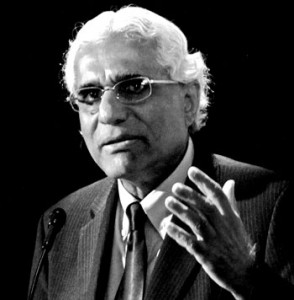Sri Lanka’s populist politics stalls prosperity

Dr. Indrajit Coomaraswamy
Sri Lanka has a toxic combination of populist politics and a deeply entrenched entitlement culture among ‘all of us’ that have stalled the country’s progress and in this context, what is most crucial is to have stability in the economy, according to Central Bank (CB) Governor Indrajit Coomaraswamy.
Speaking as Guest of Honour at the Best Corporate Citizen Sustainability Award 2016 held at the Cinnamon Grand Hotel last week, he said to achieve economic stability there should be good fiscal performance.
“There has been instability in government budgets for decades with high budget deficits, high inflation, high nominal interest rates and an overvalued exchange rate economy. The government now seem to be committed to address the structural problem and to fix it. It is interesting to note that since 1987 every single year, the recurrent expenditure of the country has exceeded the revenue. We got away with it because of generous donations and highly concessional foreign aid that we received from foreign countries to live beyond our means. But now we have to go to international capital markets to borrow at high interest rates,” he noted.
Referring to the country’s growth, the Governor said that Sri Lanka didn’t have a sustainable growth model that will give 7-8 per cent growth in the next few years like in other countries of South East Asia for years unless it is through export-led growth.
“There should be a growth model led by the private sector as the state does not have money to embark on developing its economy. It has to be private sector capital with foreign capital to drive the export economy as we have no other choice.”
He said no country has made any significant transformation in terms of export performance without Foreign Direct investment (FDI) that plays a significant role in terms of bringing in technology and the knowhow and to access to other markets.” We have been talking about this for many years but have not being able to put into place any such plan. Private sector-led exports are the key pillars to bring in foreign capital.”
He said the Prime Minister spoke on the development of two economic corridors such as the Western Development Megapolis Plan and the Port City Development Project which was going to be the financial centre of the Western Province, and Hambantota where the Chinese have plans to develop it to accommodate 300,000-400,000 people with 2500 companies coming into a special economic zone in 15000 acres.
He said there are plans to develop Trincomalee by a Singaporean company for the Indians and the Japanese to come together. “The benefits of these development will flow to Rajarata, the North and the South and the East as well. There is another plan for the development of Kandy by Japan.”
Keynote speaker Uchita De Soysa, Sustainable Development Advisor to the Ministry of Sustainable Development and Wildlife, said although people have been talking about environmental pollution for the past 20 years nothing has been done so far to arrest this trend as there is no political commitment in the world.
“On one side we try to develop and on the other side we take a large chunk of the ecological foot print that is growing daily.”
He said there is such a lot of chaos in the world and “we are in great desperation because we have already consumed a planet and a half worth of resources already. If we are to continue this pattern of consumption we will need another 2-3 types of Earths that we do not have. Although people have been talking about sustainability nobody had understood it”.
The Best Corporate Citizen Sustainability Award 2016 and the Grand Slam Award was won by Hayleys PLC for the fifth consecutive year while Cargills (Ceylon) PLC and People’s Leasing and Finance Plc were awarded as the 1st and 2nd runner up of the competition respectively.
The 10 Corporate Citizens awards went (in alphabetical order) to Aitken Spence Plc, Cargills (Ceylon) Plc, Ceylon Biscuits Ltd, Diesel and Motor Engineering Plc, Hatton National, Hayley’s Plc and John Keells Holdings Plc. People’s Leasing and Finance PLC, Sampath Bank PLC and Singer (Sri Lanka) PLC.


